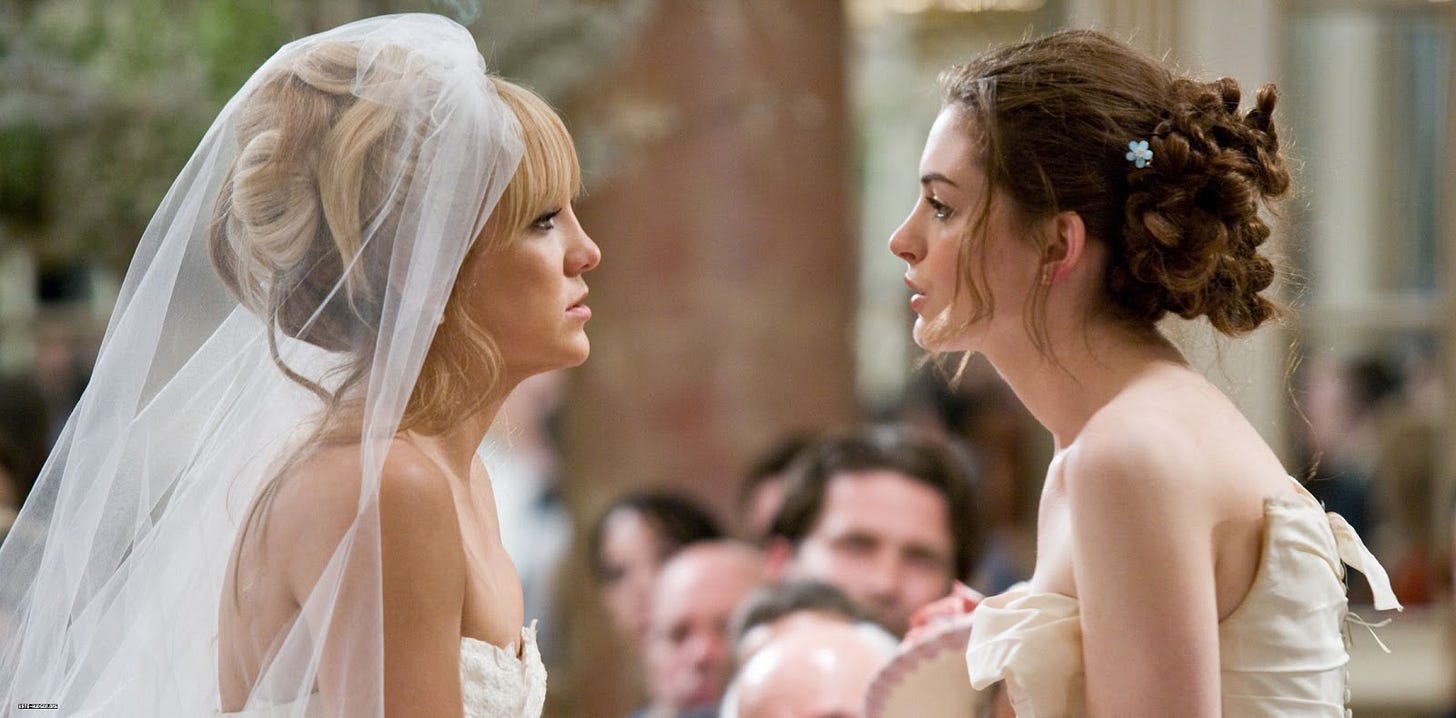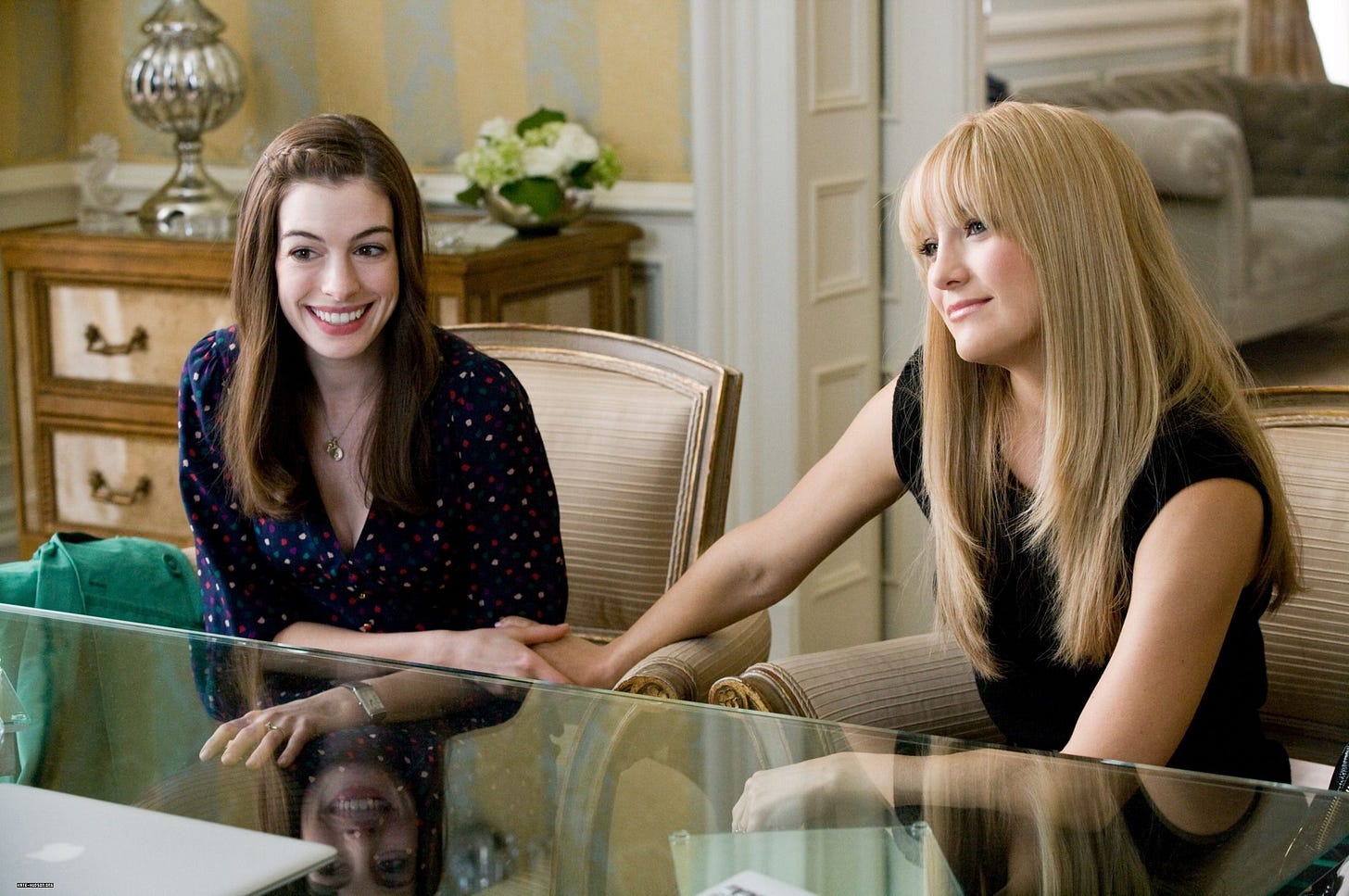Bride Wars (2009)

Movie rating: 2/10
Emma Allan (Anne Hathaway) fires the first shot of the Bride Wars when she sends out the “save the date” invitation for her wedding before Olivia “Liv” Lerner (Kate Hudson) does the same for her own nuptials. The two women, we’re told, have been inseparable friends since childhood. Emma is now a middle-school teacher, Liv a big-shot lawyer. Both have always dreamed of getting married at New York’s Plaza Hotel in June, with each the other’s maid of honour. When a clerical error results in both of their weddings being scheduled for June 6, with the next June slot at the Plaza three years away, both refuse to budge. Friends become enemies as each tries to force the other to change their wedding date.
As for me, the poor sap who saw this on Disney+ and thought it might be fun to watch a silly, lighthearted romantic comedy? The only date I should have paid attention to is the release date of this stinker: Jan. 9, 2009. For those unfamiliar, January is traditionally regarded as Hollywood’s dumping ground for bad movies and/or ones studios expect to flop. Directed by Gary Winick and written by Greg DePaul, Casey Wilson, and June Diane Raphael, Bride Wars turned out to be a decent hit, grossing $115 million worldwide on a $30-million budget. But in terms of moviemaking quality, this is a terrible January movie through and through. The two lead actresses do the best they can with what they have to work with. But the movie is fatally flawed from the outset, and the more I thought about it afterward, the more I disliked it.
The concept of two women who start as best friends, then turn against each other out of their all-consuming desire to have the “perfect” wedding is not inherently a bad starting point. There’s plenty of room there for a great satire skewing the wedding-industrial complex, an industry that was worth $70 billion in the United States alone as of 2015. Media, popular culture, and this specific business sector put huge pressure on couples, especially women, to go all-out in terms of wedding extravagance. We’ve seen the popularization of the term “bridezilla” to describe a bride-to-be who exhibits diva-like behaviour. For all the talk of female empowerment, the idea is still widespread that a woman’s wedding day is the most important day of her life. Businesses reap massive profits from such lofty hopes and expectations.
Unfortunately, Bride Wars doesn’t feel that satirical. It’s not a black comedy. The movie wants to have its cake and eat it too. It shows Emma and Liv becoming the most bitter enemies and acting in horrible ways to each other, yet still wants us to like them and value their friendship. How does each try to sabotage the other’s wedding? Emma has large amounts of chocolate and sweets delivered to make Liv gain weight so she won’t fit into her wedding dress. Liv sneaks into a tanning salon to make Emma’s spray-tan bright orange, so that her skin tone resembles the 45th president of the United States. Emma retaliates by switching Liv’s hair dye to turn her hair blue. (Incidentally, how did two women who are no longer on speaking terms know when the other was scheduled to visit the tanning salon or hairdresser?)
The movie’s central problem could be resolved if either of the main characters got married at a different place. Yes, many friendships have ended over silly reasons. No, I’m not this movie’s target demographic. But when both these women are willing to trash a life-long friendship to have the “perfect” wedding, it made me stop caring about either of them or their friendship. How valuable can a friendship be if both parties are willing to destroy it over something so superficial? It doesn’t help that Hathaway and Hudson don’t have that much chemistry, though I blame the writing more than the actors.
The supporting cast leaves little impression, with a couple exceptions. Candice Bergen is wasted as Marion St. Claire, the most famed wedding planner in New York (and the film’s narrator). A young Chris Pratt does what he can as Emma's fiancé Fletcher Flemson. The script’s depiction of their relationship squabbles, largely due to Fletcher’s controlling behaviour, is somehow both heavy-handed and not explored enough. Kristen Johnston is one of the film’s few highlights, giving a funny performance as Emma’s lazy, irritating co-worker Deb Delgado, whom Emma reluctantly chooses as her new maid of honour. Emma and Liv’s group of friends, on the other hand, are all bland and interchangeable. They also don’t seem like such great individuals when they all go to Liv’s bachelorette party leaving Emma to drink alone, oddly in the same bar.

One bizarre decision is the lack of screentime for Emma’s father John (John Pankow), who appears so little I wasn’t even sure which of the two women was his daughter until the final act. Even he gets more screentime than Emma’s mother, who doesn’t show up until the wedding day. I’m not even sure what Emma’s mother’s name is, or that of the actress who played her.
The movie grows more tedious as it goes along until the climax, when it just becomes embarrassing to watch. In their unhinged behaviour, Emma and Allan go from merely unlikable to repellent. We’re supposed to look past the insanity that unfolds at the Plaza, yet I don’t believe these women would ever remain friends after such a degrading public spectacle. I don’t think I’m spoiling anything to say that the film ends on a happy note, with everything neatly tied up. It feels totally unearned, shoehorned in only because that’s how these movies are supposed to end.
People watch romantic comedies because they want an escape from harsh reality; to watch attractive, likable people fall in love, and live happily ever after. That’s what I wanted, but by the end of Bride Wars I couldn’t stand any more time with these individuals. Emma and Liv don’t care about each other’s happiness for most of this movie, so why should the viewer care? The ending feels like a bad joke, so incongruent is it with what’s gone before. Instead of having my heart warmed, I could only shake my head in disbelief. Avoid.




